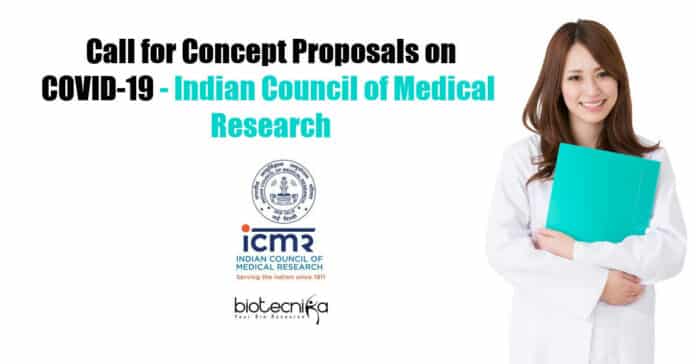Call for Concept Proposals on COVID-19 – Indian Council of Medical Research
Call for Concept Proposals on COVID-19 at ICMR – Applications Invited. ICMR Call for Concept Proposals on COVID-19 Notification. Interested and eligible applicants can check out all of the details below:
This Call Expires In:
Indian Council of Medical Research
Department of Health Research, Ministry of Health
and Family Welfare, Government of India
Call for Concept Proposals on COVID-19
Background
The COVID-19 pandemic has led to major loss of lives and livelihood. Despite intense efforts of the global scientific community, there is scanty knowledge related to the functional aspects of the virus, its transmission dynamics, immunological response to natural infection and vaccines. In addition, it is important to understand the drivers of vaccine hesitancy and reduced uptake, the clinical spectrum of the disease and its progression. Also, there is a need to formulate clinical management protocols in line with the emerging global evidence.
ICMR had initiated research on COVID-19 in Task Force and intramural mode. These projects were formulated to address the most pressing research questions in the following domains:
– Clinical Research
– Diagnostics & Biomarkers
– Epidemiology & Surveillance
– Operations Research
ICMR now invites independent researchers all across the country to contribute to the scientific knowledge related to COVID-19 by submitting their innovative research ideas as brief concept proposals in the following identified priority areas:
A. Epidemiological and surveillance studies:
- Assess the impact on the development of variants between those who are vaccinated and unvaccinated individuals in a limited geographic area
- Seroprevalence studies to determine the susceptibility of individuals to SARS-CoV-2, as well as follow up seroprevalence studies at sites covered earlier to measure the impact of vaccination/herd immunity level
- Surveillance of COVID-19 reinfections in previously infected individuals with same/different SARSCoV-2 strains
- Effectiveness of vaccines in reducing transmission
- Develop an appropriate model for surveillance of COVID-19 in schools & colleges
B. Laboratory studies:
6. Identification of specific functions of SARS-CoV-2 proteins on the following:
a. host genes up / downregulation
b. excessive cytokine release
c. proof-reading function of RdRP
d. transcription to replication switch
e. involvement of miRNAs
7. Generating infectious cDNA for SARS-CoV-2 RNA and performing site-directed mutagenesis to identify virulence and transmission factors
8. To develop appropriate laboratory assays and algorithms to identify variant strains of SARS-CoV2
9. Studies to determine transmissibility and disease severity with variant strains of SARS-CoV-2
10. Whether infection with CoV2 interferes/suppress influenza infections: in vitro interference in replication: CoV2 followed by influenza virus (and vice versa) could be tested in a suitable cell line(s) that are susceptible to both the viruses
11. Studies on ACE-2 receptors in the Indian population and their interaction with SARS-COV2
12. Assessment of transplacental and breast milk antibodies
13. Development and Reproductive Toxicity (DART) studies for COVID-19 vaccines.
C. Immunological aspect and vaccine efficacy research:
14. Studies on immunological response to the COVID-19 vaccines in different (in terms of ethnic/socio-economic / gender) populations/population sub-groups in the country
15. Duration of protection offered by COVID-19 vaccines, and factors affecting it (age, sex, comorbid status, ethnicity). Vaccinated cohorts may be followed for up to 2 years
16. Studies on correlates of immune protection (in vaccinated as well as naturally infected individuals)
17. Assessment of antibody and antigen-specific responses in SARS-CoV-2 infected and naïve
individuals immunized with COVID-19 vaccines
18. Efficacy of COVID-19 vaccines in previously infected individuals, and potential scope of a single dose vaccination in such individuals to boost immune response
19. Evaluating the safety of COVID-19 vaccines in individuals with autoimmune disorders
20. Evaluating COVID-19 vaccine efficacy in PLHIV, and determining the need for a CD4 T+ cell cutoff for vaccination in such individuals
21. Determining the need and timing of a third COVID-19 vaccine booster dose by measuring antibody titres and their persistence in vaccinees after the second dose of the vaccine
22. Measurement of pre-existing adenovirus antibodies in those who have received Covishield vaccine: whether this would affect the timing and efficacy of subsequent boosters
23. Interchangeability of COVID-19 vaccines
24. Whether measurement of neutralization titres in COVID-19 vaccinated individuals and individuals with natural infection would be lower against novel strains and variants of concern
25. Studying immune escape of variant SARS-CoV-2 strains in vaccinated individuals
26. Surveillance of post-vaccination breakthrough COVID-19 infections by a follow up of at least 2 years
27. Studies to identify non-responders to COVID-19 vaccines (especially in old age, Diabetes, CKD, HIV, malignancies), and assess strategies to overcome non-response for use in public health practice.
28. Studies to determine the immune status of re-infected individuals, as well as individuals co-infected with Influenza virus and SARS-CoV-2
29. Cross protection offered by other circulating human Coronaviruses against SARS-CoV-2. In vitro neutralization studies may be planned to check the cross-reactivities of antibodies
30. Characterization of immune response in naturally infected and vaccinated individuals.
D. Clinical research:
31. Changes in COVID-19 mortality/ severity/ hospitalization after vaccination
32. Studies on MIS-C in the pediatric group
33. Research on Post COVID syndrome/Long COVID, and assessing differences between asymptomatic and symptomatic cases, if any
34. Effectiveness of syndromic management of COVID-19
35. Correlation between variants and clinical severity
36. Determinants of severity and death among young adults
37. Clinical trials of repurposed and new drugs
38. Studies to assess the safety of COVID-19 vaccines in pregnant and breastfeeding women in programmatic mode.
E. Socio-behavioral research:
39. Drivers of vaccine hesitancy across India (social / system related / cultural determinants of uptake/ resistance/hesitancy with regards to vaccine uptake), in different geographical locations.
40. Drivers of reduced vaccine uptake among different groups of people (groups prioritized for COVID19 vaccination/ like migrants, sexual minorities, tribal populations, urban poor), and ways to overcome them.
41. Adherence to COVID appropriate behaviour in individuals and communities post-immunization with COVID-19 vaccines.
42. Studies to ascertain community level heterogeneities in vaccine uptake and protective immunity, and how this affects herd immunity in addition to contributing to the sustenance of the pandemic (in small/vulnerable/marginalized groups in a community)
43. Interventional research in sites where the rise in COVID-19 transmission has been frequently observed, and develop demonstration projects through involving and enabling local communities in addition to other stakeholders who would lead the process of implementation of these interventions.
44. Studies on social and health system determinants of response and non-response to COVID-19 vaccine at individual and group level.
F. Policy studies:
45. Develop a model for service delivery using public-private partnership in vaccine rollout using various approaches.
46. Costing and health economics studies around different COVID-19 vaccines, including economic modelling
47. Impact of COVID-19 vaccination on other infectious respiratory diseases (e.g. Influenza), whether their incidence is rising or declining
48. Overall impact of COVID-19 pandemic on other respiratory illnesses, for example, how hampered access to DOTS during the pandemic has affected Tuberculosis patients
49. Experience sharing among different countries post COVID-19 vaccine rollout
50. Studies to determine the impact of COVID-19 vaccination in different work settings, especially health care settings – in terms of protective guidelines, quarantine rules and other work-related conditions
51. Studies to determine health system implications (for other core health system services) of ongoing COVID-19 vaccination and COVID control activities, and its gendered dimensions – given the burden and helplessness of frontline workers who are mainly women
52. Studies to determine practice level changes emerging from the COVID experience – for example the feasibility of telemedicine and how these opportunities/challenges can be built upon in the future for TB, Non-communicable diseases and other diseases.
53. Strategies for expansion of COVID-19 vaccination coverage in rural India
54. School reopening strategies
55. Behavioral/cognitive/nutritional wellbeing of children during the COVID-19 pandemic.
How to Apply:
All concept proposals should be submitted online at https://epms.icmr.org.in as a brief 3-4 page concept note on/before 30th June 2021, 5:00 PM. Format of submitting concept proposals can be downloaded from: https://epms.icmr.org.in/extramuralstaticweb/pdf/Adhoc/concept_proposal_format.pdf
The online portal will be closed thereafter.
All concept proposals will be screened at ICMR. If approved by the screening committee, selected investigators will be requested to submit full proposals.
The full proposals will be thoroughly reviewed by Project Review Committees and the decision will be made accordingly.
Important Note:
- Open the ICMR Electronics Project Management System (e-PMS) portal
https://epms.icmr.org.in. - Project proposal submission is three steps process in e-PMS.
Step 1: PI Registration/Login
Step 2: Verify Email Id and Complete/Update PI Profile
Step 3: Apply for Grant through submission of Ad-hoc proposal - Click on “Log in and select “Register” for new registration OR else if already registered
provide details to log in and enter into the e-PMS portal. - After registration in the portal, login into the portal. Verify your registered email and
complete the PI profile. IP profile includes Personal detail such as Salute, Name, DOB as
per 10th certificate, Details of 10th (Board name, roll number, Year of passing), Attachment (10th certificate/mark sheet), Gender (Male/Female), Category (GEN, OBC, SC, ST), State, District, Institute Name (if the name doesn’t exist in the drop-down list then there is an option to add the new institute also), The designation, Nature of Employment, Department, Broad Area of Research, Subject Area. - After completing a mandatory section of PI Profile, click on “Submit Concept Proposal”
under the “Proposal Submission” menu. Click on “Apply” in the action column. - The user manual of e-PMS (under Guidelines-> e-PMS menu) is available at
https://epms.icmr.org.in. Before proceeding with the submission of the proposal, it is suggested to read the user manual and guidelines; and make ready all relevant information, documents and research plan. - Contact [email protected] for any technical issue or query.
See Notification Below
Editor’s Note: Call for Concept Proposals on COVID-19 at ICMR – Applications Invited. Please make sure that you are subscribed to the Biotecnika Times Newsletter and our YouTube channel to be notified of all of the latest in the industry. Follow us on all of our social media like Twitter, Telegram, Facebook and Instagram.









































